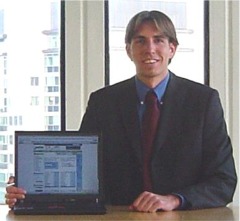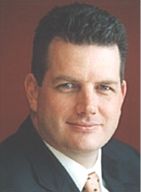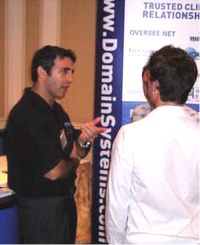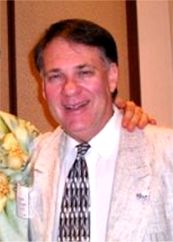

![]()
| 2004:
It Was a Very Good Year - But Now What? Industry Experts Say The Best Is Yet to Come! |
||||||||||||||||||||||||||
By Ron
Jackson
|
|
|||||||||||||||||||||||||
I
say that with confidence because we have called upon some of the
domain industry�s brightest executives, top attorneys and leading
domain portfolio owners to help us analyze the most important events
and trends of 2004 and what fruit those and other forces might bear
for this business in 2005. 2004 marked an enormous turning point for
the industry and the Internet in general. The bust is behind us and
a far sounder business with unlimited growth potential has emerged
from the wreckage.
Schwartz
said �I believe 2004 proved to be the single most important year
on the Internet to date and 2005 promises to be exponentially
better. We saw high ticket domain acquisitions week after week
culminating with the $164 million purchase agreement
Marchex made to
acquire the Name Development Ltd. portfolio (Editor's
Note: often referred to as the Ultimate Search
portfolio). We saw one team on the
Apprentice TV show defeat the other by a 12-1 sales ratio by
employing the power of the Internet in a time sensitive project to
score a resounding public win over traditional marketing methods. We
saw wireless begin transforming everywhere we go into �hot
spots� making access to the Internet more widespread and
increasing traffic, we saw a presidential race in which the main
battle ground was the Internet�and all of that just barely
scratches the surface!� Schwartz said. In the 2004 Christmas selling season brick & mortar stores showed little or no growth while online sales boomed, growing by well over 25% from the previous year. Schwartz (who was the subject of DNJournal�s Feb. 2004 Cover Story) believes those numbers were a watershed event for the Internet. �I believe this will lead to a complete re-thinking of online efforts for all businesses and a shift in advertising dollars that will have a significant and long lasting impact that will shake things up to the core. Their complete marketing focus is about to change and a new race has begun. As we go through 2005, pay per click payouts should continue to increase and targeted traffic will skyrocket. That directly affects the value of domains which will continue on their torrid upward pace,� Schwartz said. Though
we seemed to be straddling a rocket throughout 2004, Schwartz
believes the thrill ride has just begun. �The net is still years
away from being all it can be and therefore the value of domains has
yet to peak. There is still a lingering �attitude� among some
that went through the collapse, but they will not survive in the
future unless they are ready to adapt and recognize that it is
traffic that fuels the net and domains are the purest source of that
traffic. As domainers, we have been on the cutting edge of progress
itself and our most fruitful rewards are still to come as the space
continues to grow, flower, innovate and attract great minds and
business people. These truly are exciting times and to know that the
best is yet to come is overwhelming in the very best way. It�s an
outright REVOLUTION that historians will write and talk about until
the end of time!� Schwartz declared. The Marchex deal (to be completed this spring and contingent on Marchex successfully raising the funds for purchase through a public offering) was a defining event that opened a lot of eyes in the corporate world to the value of high traffic domains. For the first time an important corporate entity placed a hard value on the revenues produced by a specific portfolio. The $164 million represents more than 8x the annual revenues of the Ultimate Search portfolio. Those revenues come from landing pages on domains with type-in traffic that display pay per click (PPC) advertisements.
Bentley
added, �In an efficient and perfectly transparent market, all
parties will have the information (visitor numbers, traffic origin,
quality of traffic, etc.) needed to accurately determine a domain's
value. Look to marketplaces (including Sedo) to increasingly provide
the tools and information needed to fill this gap. Of course,
as markets become more efficient, it becomes more and more difficult
to eke out a profit.� It
does look like the days of flying under the radar and reaping big
profits from easy to pick low-hanging fruit are coming to a close.
Paul Cotton, one of the three able administrators that founded the
DomainState.com forum, has always been respected for his no-nonsense
approach to domain valuation. He was probably the least surprised
person in the industry when expiring domain services almost all
moved to auction models pushing prices skyward but more in line with
their true values. Cotton
told us �2004 seems to be the year the domain market got serious
and started applying traditional business metrics across the board.
Names being bought based on revenue or with a clear commercial
resale focus have stepped up a gear and end users seem to be more in
tune with what these assets mean for their business. That has
created solid foundations for trade purchase prices, especially the
drop sites. Those able to get the best return have been able to
spend more to acquire them and scale has certainly become an
important weapon in the war to get good names. Those with the best
conversion mechanisms are able to spend many more years worth of
revenue than the average Joe, whilst being confident of a quicker
turnaround on their investments.�
Warner
added, �another major network allowed gross manipulation of their
contextual advertising feed which in turn ended the year by
implementing a black box solution to stem quality issues. In
addition a mid-range player has been allowing adult and other
untargeted traffic to be pushed to loan and other high value
advertiser links in one of the worst �advertiser burn�
implementations since the dot com boom. Conversely, if you have high quality traffic you are in the driver�s seat. Warner said, �revenue for traffic that comes from targeted commercially oriented domains will continue to skyrocket. General domains that focus on the �surfer� rather than the �consumer� will begin to falter. The cowboy days of domains are ending � the corporate domain channel is emerging. From all indications it appears that consolidation of Internet marketing domain portfolios is imminent this year. With the bulk of marketing domains being controlled by fewer than twenty businesses (mostly individuals) and large public corporations emerging with major capital opportunity to invest, how long will it be before the dominos fall and twenty portfolios become less than five?
Mann also believes fewer good domains will turn up on the resale market because current owners will be able to do better by making strategic use of their properties that will produce greater revenues than could be realized from a one-time sale. He has already begun that process with the enormous BuyDomains portfolio by setting up free services that are generating massive (and highly saleable) traffic. �Our SeeqMail product allows people to use any of hundreds of fantastic names for their email for free, forever,� Mann said. "Moreover, our Seeq.com network of portals uses excellent domains to brand each site and promote topical services. We are also building out other free sites and services to expand our user base, like Blogs.net where anyone can keep a free blog online to share with the world." Thunayan
K. AL-Ghanim (known as Elequa and the subject of our March 2003
Cover Story) is another large portfolio holder who plans to
keep his domains for his own strategic use. Elequa insists none of
the tens of thousands of domains he has acquired are for sale. He
told us his company, Future Media Architects, Inc. (FMA.com), is
positioned to flourish in this rapidly changing environment. �We
have acquired a large number of very high quality domains; cool.com,
ibiza.com, media.com, party.com, Mr.com and so on, and have our
strategic plan for future growth in progress and ready to be
implemented in 2005. We believe DJ.net has become the place to be
seen in the Disk Jockey industry and I.net (Editor's
Note: an ICANN accredited
registrar he purchased last year) will soon become the registrar of
choice.� With
giant portfolio owners like BuyDomains, FMA and Name Administration
controlling more and more of the action, Sedo�s Bentley said the
clock is definitely ticking for the small player who wants a piece
of the pie. �If I were a domain investor, I would be in a buying
mode right now, trying to build as strong a portfolio as possible
while the acquisition costs are still relatively low (yes, in 2005
it will get much more difficult to acquire bargain inventory),�
Bentley said. One well-known company CEO who preferred to remain anonymous told us �If you don't have an Inc. after your name, prepare to be squeezed. There is some serious cash being thrown around in the secondary market these days and the big players are starting to go looking for their piece. Domain owners who aren't safely tucked into an obscure niche will find themselves competing on the acquisition side with larger organizations who are able to squeeze a few extra pennies out of each visitor, and thus pay higher prices.� He added �parking companies will also increasingly feel the pressure and consolidators are likely to be wiped off the map if they're not adding some significant value to the chain. The industry is entering a period of consolidation, and the industry landscape at the end of 2005 will most likely not look anything like it does today."
Cahn
added that with domain values rapidly rising, security for those
properties has become a front burner issue. �As a domain services
company, we saw that customers truly value customer service and
security - more so in 2004 than in any other year in my memory. The reasons abound; domain loss and theft, hundreds of registrars
that are operating without support and interfaces and the new ICANN
Transfer Policy which enables registrars to just release domains if
they are unlocked has really driven customers to full service
registrars such as Moniker. I have seen major shifts in
opinions and behavior with customers who had fought strict transfer
out policies that were set up for their protection now grateful
because those policies saved them from their domains being
stolen.�
Arrington
said he sat in one meeting at the recent ICANN gathering in South
Africa where a plethora of ideas were put forth to reign in the
biggest problem with the status quo � the mass creation of new
shell registrars who�s only function is to grab domains out of the
daily drop. �This is no small problem,� Arrington said.
�Domain holders have to deal with the various customer interfaces
of over 180 different registrars (remember domains cannot be
consolidated to a single registrar for 60 days) and there is a much
bigger problem on the horizon � a customer service nightmare WILL
occur as these registrars, who have no incentive to provide any
customer service whatsoever, begin to ignore registrar transfers,
DNS updates and other standard requests by customers. And, worst of
all, as the cost/benefit analysis of owning a registrar tips the
wrong way (as the number of registrars skyrockets and the ICANN tax
increases), we will see registrars fail outright as businesses with
no concern over, or protection of, the domains they control. Does
ICANN have a plan in place to deal with this inevitable problem? I
doubt it.� Arrington said. He
added, �What can be done to address this? Really, nothing - at
least, not until the industry pulls itself out of the weeds and
stops trying to micromanage issues. The parties argue over WLS (yes
it is still alive), ratio models, registry-level auctions and
charges for add and check commands. The giants of the industry (ICANN
and VeriSign) are arguing in court over their relative powers to
regulate and launch, respectively, new products. Until these issues
are resolved, it is unlikely either will be able to step in and
address the chaos. There�s an opportunity for the rest of us to
stop fighting and, for once, actually take care of business, but we
need to put away our political agendas and work together. If
we don�t, we�ll have to continue to wait for parental guidance
from whomever comes out on top in the power struggle.� �There
is one development that gives me hope that the craziness may soon be
ending,� Arrington said. �SnapNames launched a new service with
Network Solutions that actually transfers to-be-deleted domains to
new registrants before they go through the VeriSign batch delete
process. This makes sense for Network Solutions and other registrars
because they get to keep the majority of the revenue generated by
the domain (which they share with the original registrant). The
registrar also keeps the domain registration, which allows the new
registrant to both bypass the 60 day transfer period and avoid
dealing with unknown and unreliable registrars.� Some
have questioned whether these new exclusive auctions violate ICANN
rules, but Arrington (who also happens to be an attorney) said
�these deals are completely legitimate under existing ICANN
policies, and the evidence is that very few customers are
complaining about the new procedures. It seems likely that the other
large registrars will soon follow suit and launch similar services
in partnership with SnapNames or competitors,� Arrington said. The
new services could spell the end for Verisign�s controversial Wait
List Service (WLS) which would have given them control of ALL
expiring .com and .net domains. ICANN approved the service in March
2004 but it was never implemented as competitors fired back with a
barrage of lawsuits. Arrington
said, �Here�s what I like best about this development. First, it
doesn�t require industry consensus � it is happening already.
Second, it removes the incentive for people to create new registrars
because fewer and fewer domains will actually make it to the daily
drop, which aversely affects the economics of owning a registrar. My
advice to registrars: help clean up the industry while
simultaneously taking advantage of this new revenue opportunity by
partnering with SnapNames or others to auction deleting domains
immediately. You�ll be glad you did.� That
advice might startle some. After all, SnapNames was one of Pool�s
biggest competitors when Arrington ran the company. SnapNames got
blindsided when Pool introduced their auction model and practically
took over the business by attracting the majority of registrar
partners through increased payouts. However now SnapNames is back on
top of the drop catching game after installing their own auction
model and getting that exclusive partnership with Network Solutions
(the holder of many valuable domains dating back to when they had a
monopoly on domain registrations). The
Vice President of Marketing & Corporate Communications at SnapNames.com, Mason
Cole, recalled that SnapNames originally got into
the business in 2000 because they saw that there was no effective
and intuitive way for end users to pick up a deleting name. Here we
are five years later and that still hasn�t changed! Cole said,
�the supporting infrastructure for redistribution is simply not
present. At present, some solutions have arisen, but on the whole,
customers still don't have a great experience. We've tried hard to
bring order to chaos and recently we think we've taken a big step in
the right direction with our new transfer fulfillment program aimed
a registrar-level redistribution.� Cole
added, �2005 will be a challenge for everyone as the industry
continues to sort itself out. ICANN has a lot on its hands and needs
to step up to meet its commitments and not try to micromanage every
possible issue. Aside from those issues, the fundamentals are strong
and we expect to see continued growth for the industry.� The
secondary market domain sales sites have benefited from the turmoil
in the expiring domains market. A lot of players have started
going to venues like Afternic.com, Sedo.com, DomainSystems.com and GreatDomains to acquire the premium domains they seek rather
than try to navigate the dropping domain maze. Afternic
president
Roger Collins (the subject of our June 2003 Cover
Story) said, �the
wacky way that expiring domain names are re-registered is a huge
story for domainers. This controversy has increased awareness of the
whole secondary domain name market among all the players in the
domain/website industry.� Collins
will certainly be a happy camper if his company�s current growth
rate continues. He told us paid memberships for the Afternic
exchange (which also offers a domain parking service) doubled in
2004 with the number of domains sold increasing by 176% over the
previous year. They rolled their parking program out in April 2004
and by the end of the year Collins said the amounts they were paying
members had increased 10 fold. Revenue sharing from their core sales
business resulted in higher payouts too. Collins told us
�Afternic's primary strategy has always been to attract buyers by
partnering with other popular websites, and as part of that drive we
started paying those partners more in 2004. Our payments to partners
and affiliates increased 1,800% to $200,000 in 2004. DomainSponsor.com is another popular company that believes in sharing the wealth with their partners. The PPC provider of choice for many of the largest domain portfolio owners seemed to increase payouts on a monthly basis throughout 2004. That fact and the effort they make to establish personal relationships with their top �publishers� has earned the company a loyal following.
Neu
said the jailing of one of his former clients, John Zuccarini was
also a significant event in 2004. He told us, �that hit home with
potential "typosquatters" who trade and depend upon
Internet users misspelling trademarked or famous names in order to
profit there from. They can no longer direct innocent children and
others to adult web sites by using typos of famous people or
trademarks as their domain names without the prospect of suffering
some serious consequences.� Ron
Sheridan said there was another decision of huge importance in the
legal arena - Google�s courtroom victory over the giant insurance
company Geico. Geico did not like the fact that people doing a
search on the company�s name would see a Google results page that
included paid ads from competitors so they sued to try to stop it.
The courts ruled Google was doing nothing wrong. Sheridan said
�seems to me this is a significant win for our space since it
ensures a lot of competitive PPC bidding activity and that will have
an overall positive lift effect on PPC values. Since our focus
is monetizing traffic primarily via paid search, we see this as a
positive.� He added, �interesting to me how Overture capitulated
but Google decided to fight, and in the end won. Is there a
lesson there? � All
of this talk about lawsuits and corporate takeovers in the traffic
space might leave new individual players wary about stepping onto
the playing field but as Paul Cotton points out, new horizons opened
up for smaller players in 2004 as well. �Google�s Adsense
program has had a big impact on the domain market at that end of the
scale. By using the search engines to draw traffic and Adsense
to provide a revenue mechanism, people with good terms that don't
get inherent traffic now have a way to put the domains to work in
bringing in revenue other than waiting to sell them. This has led to
more money flowing back into the domain buying pool - which has seen
premiums paid for keywords in some of the more obscure TLDs as they
no longer have to fend for themselves in terms of revenue. As
long as the search engine revenue can offset the buy prices and
leave a good profit overall then there�s no reason why this
development revenue backflow will cease.� Canadian
Adam Dicker of High Impact Sites (a company that operates hundreds
of live websites including the popular DNForum.com) concurs that
Adsense has been great for the industry, but now he would like to
see some competitors emerge to give publishers a choice. In addition
Dicker is not quite ready to cede the traffic segment to mega
corporations. �The best way to achieve financial freedom is from a
portfolio of good PPC domains,� he said. �It is not important to
hit a home run with one domain, it is important to hit a home run
with a combined portfolio.� Dicker said good names can still be
acquired if you look in the right place. �Good PPC domains are now
almost impossible to get through drops - the only way to get good
domains is to buy them from their owners.� Of
course every industry has their contrarians who believe in going
against the flow of traffic. In this business, that group is well
represented by New TLD fans. Rather than fight the crowds lusting
after high traffic .coms, they have taken large positions in .info,
.biz and .us domains. Money does not come from PPC here because the
public isn�t typing in those extensions at this early stage of the
game. Though many see it as a bet on the future, several working in
that space started seeing profits in 2004 from sales to smaller
business entities that have been priced out of the .com market for
generic words and popular 3-letter acronyms. Certainly
.com is the engine that pulls the train (77% of all sales above
$10,000 in 2004 were .coms) but the higher up the mountain the train
goes the more customers are created for those selling in the
caboose. As with almost all other consumer products, a tiered market
seems to be developing. To use an automotive analogy, you have
Ferraris (.com) at the high end, Fords and Chevys in the middle
(.net, .org and established ccTLDs) and Hyundai serving the budget
conscious (new TLDs). Money can be and is being made at every level
of the market, but there is still a natural curiosity about whether
or not the new TLDs will be able to rise in the pecking order. Several
investor/developers spent the past year trying to make that happen
by busily building out new extension websites. One of the most
active in that group is Chris Zouzas who holds
many of the best .us domains (including Movies.us and the
recently acquired America.us). We asked him what he
considered to be the most important event for New TLDs in 2004. �I�d have to say the advertising
of VolvoCars.us during the final episode of Friends on
NBC-TV last
spring,� Zouzas said. The ad was believed to have cost about $2
million and reached an estimated 50 million viewers. Zouzas said
�a company willing to spend that kind of money on a new TLD says a
lot for the .us extension.� Zouzas
also believes the VolvoCars.us example disproves the belief that
every new extension site is going to lose a big chunk of it�s
traffic to the .com counterpart. �I looked up VolvoCars.us at
Overture in November, months after the TV ad, and it scored 450 with
the extension. At the same time VolvoCars.COM had 0 with extension.
Regardless of extension, folks use a site based on content and what
the site does for them. They don�t go to a site because it ends in
.com.� Zouzas
is a big fan of country code domains in general. With Germany�s
.de the second most popular extension in the world and the UK�s
.co.uk right behind (and growing rapidly) the potential is obvious.
�Targeting specific markets can only come from targeting the local
population,� he said. �If I�m looking for something in Germany
I�m going to check .de before typing another extension. Volvo
seems to be doing that with VolvoCars.us targeting the US market and
you also see it with the advertising of Hitachi.us on FOX-TV. I
think more companies will be following this type of marketing and
selling plan� Zouzas
also likes .info, the new global TLD that was easily the best seller
among new extensions in 2004 with over 72% of the sales above $1,000
(largely due to strong pickup in Germany and northern Europe). �I
think .info has the potential to be a truly unique presence with its
own identity and when people want information as opposed to
ecommerce, .info will be the first choice.� Zouzas said. .Info
and .biz got a big boost early last year when one of the biggest .com
portfolio owners, Elequa, stepped into the new TLD space and bought
up every remaining 3-letter domain (thousands of domains in the span
of just a few days). This event was the subject of our March
2004 Cover Story. With the supply now gone, 3-letter prices have
gone up dramatically since then, capped by the $10,492 sale of
HMS.info (and including several others in the low to mid four figure
range in all 3 new extensions). Zouzas
is so convinced new TLDs will continue to rise he wonders if
Ultimate Search saw some handwriting on the wall when they decided
to sell out to Marchex. �Ult was ahead of everyone else with PPC
pages and catching domains. So are they ahead of everyone now in
dumping their .com portfolio?" he asked. Did they foresee the dilution of .com
from other TLDs? I dont know and I�m sure they'll never say!�
Of course, they may also have realized that $164 million in the bank means never having to worry about where your next meal is coming from (nor meals for all of your descendents for at least the next century or so). Obviously with steadily rising .com prices there has been no sign of dilution so far and we doubt there will be because the pie is getting bigger for everyone. An Internet presence is now practically a necessity for every business entity � it should be as automatic as having a business card. In addition more and more
individuals want their own domains for email, blogs, resumes, family
photos and the like. In 2004 an average of more than 1 million new
websites went online every month! With that kind of inflow we
see a rising tide that will continue to lift all boats. It�s a
great industry with lots of places do some prospecting and stake
your claim. Given
how much things have changed in the past 12 months, it�s hard to
imagine exactly what this industry will look like at this time next
year. However, we will predict that it�s going to be a heck of a
lot of fun finding out!
Editor�s Note: For those who would like to comment on this story, we invite you to make use of our Letters to the Editor feature (write to [email protected]).
If you missed our previous Cover Story click on the headline below: AmericanFlags.com: How Jeff Reynolds Turned His Bargain Domain Into a Star Spangled Business All other previous Cover Stories are available in our Archive |
||||||||||||||||||||||||||
|
|
Copyright 2004
Domain Name Journal
A Division of
Internet Edge, Inc.












